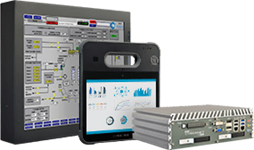Industrial
Success Stories & Case Studies
Industrial and Manufacturing environments can wreak havoc on IT hardware. Extreme temperatures, particulates in the air coupled with constant shocks and vibrations can kill a computer fast. Take a minute to read some of our recent success stories with our industrial customers to learn how they are taking advantage of the reliability of Cybernet's industrial computers.
 Challenge
Challenge
UGN revamped their manufacturing software, which had the side-effect of increasing the strain on their computers’ RAM and processors. Their old computers simply weren’t up to the task, and they needed to find a replacement.
 Solution
Solution
The suggestion to try Cybernet came from the top down, so UGN deployed Cybernet’s iOne H6 model on their manufacturing lines. They served primarily as quality control at the end of the line, checking and printing part labels
 Results
Results
Despite the heat or cold of the warehouse, the outdoor conditions near the dock, and the purposefully humid conditions in the fleece department, Cybernet computers have performed without a hitch no matter the environment.
 Challenge
Challenge
Sonny’s Direct creates car wash equipment and tunnels for local businesses. Their point-of-sale commercial computer controlled all of the automated equipment in the car wash tunnel but was found to be too slow and fragile.
 Solution
Solution
Cybernet’s tablet and PC were deployed in concert to speed up operations. The Rugged X10 tablet became the point-of-sale device, while the iPC R1 mini-rugged became the rack-mounted controller for the car-washing equipment.
 Results
Results
The Rugged X10 and mini-PC sped up car wash operations, reducing the delay between sale and execution, and were tough enough to survive water damage, drop damage, and a wide array of regional humidity and temperatures.
 Challenge
Challenge
Ulterra’s intense manufacturing process produced a ton of graphite dust, which penetrated every nook and cranny of their factory. This caused the computers that ran their manufacturing software to break every 2-3 months.
 Solution
Solution
Ulterra had to find a better long-term solution. After researching “rugged industrial PCs,” they found Cybernet and immediately ordered two test units and installed them in their factory. A 4-month test produced no failures.
 Results
Results
After two years in the brutal, computer-demolishing industrial factory conditions, the Cybernet computers are still going. Cybernet computers have since been ordered and installed in Ulterra’s other manufacturing plants.
 Challenge
Challenge
WARDJet needed a powerful computer with a touchscreen interface to act as the control panel for a new software they developed.
 Solution
Solution
The Cybernet iOne C22 was the perfect fit, providing the device consistency they desired.
 Results
Results
The Cybernet iOne C22 has performed exactly as expected and will be shipped with all of WARDJet's X Series cutting tools.
 Challenge
Challenge
Mobis was rebuilding their factory floor and needed to find reliable computers. They needed integrated RFID, reliable touch screens and a company with a history of low failure rates.
 Solution
Solution
Mobis selected the Cybernet iOne H24 because of its RFID functionality, their industrial grade components and the internal UPS.
 Results
Results
All the fielded Cybernet computers have had no problems in their shop after a year of deployment. Mobis is now restructuring their entire shop floor and configuring all of their computer stations with Cybernet iOne H24s.
 Challenge
Challenge
Biofit was struggling to find computers that could withstand their manufacturing environment. They needed hardware that could manage temperature fluctuations and dusty conditions.
 Solution
Solution
They chose the Cybernet iOne C22 model because of the industrial grade components that were able to last in humid temperatures. This model was resilient against the dirty air quality. Plus, the IP65-rated screen panel was great for cleaning.
 Results
Results
BioFit has had no hardware problems with the latest Cybernet project deployment and they are very satisfied with the computers in use today.
 Challenge
Challenge
Vulcan materials needed something resilient enough to withstand the poor air quality and hot desert environments, but powerful enough to run their HMI software.
 Solution
Solution
Vulcan Materials chose to go with the Cybernet iPC-R1 because of the fanless design and the solid state drives to avoid contaminants in the computers’ builds.
 Results
Results
Vulcan Materials has been implementing the iPC-R1 over the course of the last several years. The same Cybernet computers that Vulcan initially purchased for their first plant are still operable today.
 Challenge
Challenge
Sensus had a lot of manual processes that took time and energy-materials tracking and time clock management were the largest among them and space is at a premium.
 Solution
Solution
The iOne C22 all-in-one PC fit the requirements for port selection, RFID use, and could withstand harsh manufacturing floors with its IP65 protection rating.
 Results
Results
It was Cybernet's quality, price, and range of functionality that eventually pushed them to shelf their consumer-grade PCs.
